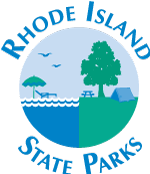John H Chafee Nature Preserve (2001)
On April 2, 2001, the Narragansett Electric Company, a National Grid Company, donated over 200 acres of pristine water front property to the state of Rhode Island in honor of the late U.S. Senator, John H. Chafee. Senator Chafee, as Governor of Rhode Island (1963-1969) championed ‘open space’ land set-asides as part of his ‘Green Acres’ program, and he was very active as U.S. senator in promoting progressive programs of environmental management.
Rome Point, in North Kingstown, as the property of the nature preserve, is known, had been under the care of Narragansett Electric since 1953. It had been considered as a site for a nuclear power plant. Care had been taken not to disturb the shoreline property. Through this gift Narragansett Electric ensured that Rome Point would remain in its natural beauty for the enjoyment of everyone in Rhode Island.
The early history of Rome Point touches two of the Colony of Rhode Island’s most contentious issues. In 1659, the land was purchased from the Narragansett Indians by a Massachusetts group of land developers, known as the Atherton Company. All of southern Rhode Island in the mid 17th century was a swirl of contradictory land claims, with Rhode Island struggling to keep out settlement islands of intruders sponsored by Massachusetts Bay and Connecticut. The land title turmoil kept judges, attorneys, and legislators scrambling for decades. Boston Neck and the Rome Point land was one such legacy of this struggle.
The second contentious matter connected to Rome Point began in 1766 and was resolved eight years later when the land was confiscated by Rhode Island because of the ‘Tory’ leanings of its then owner, George Rome.
Englishman, George Rome, had come to Rhode Island in 1761 to represent the British merchant firm of Halsey and Hopkins in rounding up debts owed them by local merchants. Afterwards, he represented other British creditors. His main base of operations was the Newport waterfront with its coffee houses, merchant counting houses, and the British customs house. His summertime retreat, however, was his rustic villa on Boston Neck in North Kingstown.
The house has been described as a gentry’s country seat. Historian, Wilkins Updike of Wickford says “the Room (Rome) farm was located on seven hundred acres. “The mansion was highly finished and highly furnished.” It featured “fold-up” beds that disappeared into the wainscoting. The “garden contained the rarest native and exotic varieties.” Rome lived in “sumptuous hospitality.” He often invited friends to join him for Christmas dinner, which offered “ a covey of partridges, or bevy of quails for entertainment to some, while the pike and perch pond amused others.” Sometimes his parties included guests from Boston, Newport, and Narragansett. Punch was the beverage of choice.
By 1773, however, his pro-British political sympathies ran counter to his neighbors’ concerns about taxation without representation. His feelings were revealed in a packet of correspondence which came into the possession of Benjamin Franklin, then serving as colonial agent for Pennsylvania. Franklin released them to the colonies, and Rome was called on the carpet by the Rhode Island General Assembly. He was harshly questioned and slapped into jail in North Kingstown.
Upon his release he fled to the protection of the HMS. Rose, a hated British warship on patrol in Narragansett Bay, seeking to break up the notorious smuggling business. In 1775, Governor Stephen Hopkins sought the General Assembly to confiscate Rome’s lands along with those of other Tories. They did and his properties were seized and sold. The land descended in private hands down to their donation back to the state in 2001. Nothing remains of the country villa.
